Objections
You Are Wrong on Marriage:
The Priest Does Not Effect the Sacrament
The editor responds:
Rev. Fr. S.P.,
Although your correction is not directed to me, but to the authors of the mentioned article on “Veils & Marriage,” Dr. Marian Horvat and Miss Elizabeth Lozowsky, as the editor of TIA website I assume the responsibility for those statements and I am responding to you. Actually, it was I who wrote that excerpt in their article in the editing process.
Basically your statement is that TIA is in error because the article states that the Sacrament of Marriage is effected by the Church in her representative, the priest.
I reproduce here the controversial text in that article:
In the Catholic marriage there are two overlapping realities:
- The human contract made by a man and a woman when, according to Natural Law, they give themselves mutually to one another and vow to spend the rest of their lives together;
- The Sacrament of marriage in which that contract is elevated to the supernatural level by the fact of the marriage being made in the Church before a priest representing her and giving her blessing. (5)
Actually, I acknowledge without any problem that the conclusion above is insufficiently clear, therefore, it is wrong. It should have included the spouses explicitly as minor ministers of the Sacrament and should have said that the major minister of the Sacrament is the Church represented in the act by the priest.
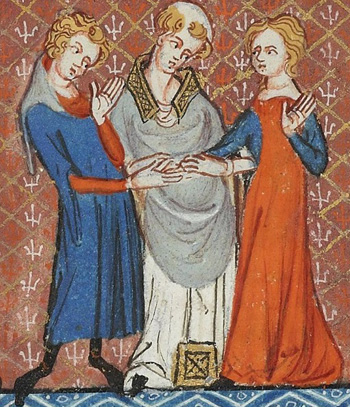
Which is the role of the Catholic Church
in the Sacrament of Marriage?
Consequently, the ministers of the natural contract are the spouses; the ministers of the Sacrament are both the spouses and the Church represented by priest.
However, in your correction you also mentioned that the Church is not the minister of the Sacrament of Marriage.
I hold a different view on this matter, which I present here to submit to you and our readers.
For the sake of clarity, our two positions could be summarized as follow:
Your position is:
The contract between the spouses is the Sacrament of Marriage. The only ministers of the Sacrament are the spouses; each administers and receives the Sacrament so that in necessity the spouses can marry without being in the Church. Even if they do not have the intention to marry as Catholics they effect the Sacrament of Marriage.
Correcting the insufficiency of the published text, my position is:
The natural contract is elevated to Sacrament when the spouses consent to marry. The Sacrament is effected when the marriage takes place in the Church. There are two ministers in this Sacrament: Our Lord Jesus Christ represented by His Church is the major minister; the spouses are its minor ministers.
I will proceed to try to prove my position and partially refute yours.
Let me state before all else that I am entirely open to change my position if my arguments are proved to be not in agreement with the teachings and the mind of Holy Mother Church.
I. Clarifying terms & notions
Four notions of sacrament are involved in marriage. It is necessary to distinguish them so that we can see with clarity who is minister of what.
- Natural marriage & its sacrality in the Old Testament - Holy Mother Church teaches us that marriage was instituted by God when He created Eve from the side of Adam and gave her to him. Adam sinned and the marriage received the consequences of that sin. Nonetheless, the marriage continued to have that sacred origin, which imprinted certain characteristics
on it.
Among other characteristics, the peoples of the Old Testament often celebrated their marriages with religious ceremonies. After the Law of Moses, the Jews had special ceremonies to celebrate the marriage. The general religiosity surrounding those marriages at times is called sacrament. Those marriages fell under the Natural Law and the Mosaic Law, depending on whether they were celebrated among pagans or Jews. The natural contracts were made by the particular man and woman – the ministers of the contract – before credible witnesses. Among the Jews, this took place before the priest, as the pious iconography shows in the marriage of Our Lady and St. Joseph.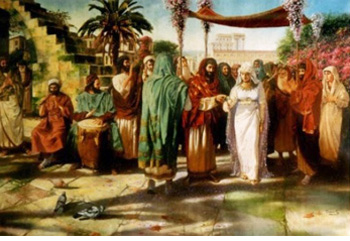
The weddings in the Old Testament were surrounded by a certain sacrality but were not the Sacrament of Matrimony
We know that the ministers of the contract were the spouses; we can discuss who the minister of that sacral ceremony is: whether it was the spouses or the religious authority.
I believe that essentially the sacral ceremony was a consequence of God’s institution of the marriage, so He was the indirect Minister; among the Jews, the religious ceremonies around the marriage would contribute accidentally to increase that original sacrality, so the priests assisting those ceremonies would be their direct ministers. Among the pagans, some caricatures of those Jewish ceremonies would bring a disputable religious atmosphere to the celebration of a marriage. I will not analyze the pagan ceremonies here.
Some authors call this atmosphere of sacrality that surrounded the natural contracts in the Old Testament a sacrament and confound it with the Sacrament of Matrimony. Neither the natural marriages nor the religious marriages among the Jews were sacraments.
This is confirmed by the Catechism of Trent, which affirms:
“The great superiority of the sacrament of matrimony to those marriages made both before and under the Law of Moses may be judged from the following consideration. The Gentiles, it is true, looked upon marriage as something sacred, and therefore considered promiscuous intercourse to be inconsistent with the law of nature: They also held that fornication, adultery and other licentious excesses should be repressed by legal sanctions; yet their marriages had absolutely nothing of the nature of a sacrament.
“Among the Jews the laws of marriage were observed far more religiously, and their marriages, undoubtedly, were more holy. As they had received from God the promise that in the seed of Abraham all nations should be blessed, it was justly deemed by them to be a duty of great piety to beget children, the offspring of the Chosen People, from whom Christ the Lord and Savior was to descend in His human nature. But their marriages also felt short of the real nature of a sacrament.” (Roman Catechism, Part II, VIII, V, 3) - Natural marriage among pagans in the New Testament – Those peoples who did not enter the Catholic Church continue under the regime of the natural marriage, as in the Old Testament.
In other words, they contract a valid marriage surrounded by a certain religious atmosphere. The spouses are the essential ministers of the marriage; the religious celebrants would be the accidental ministers.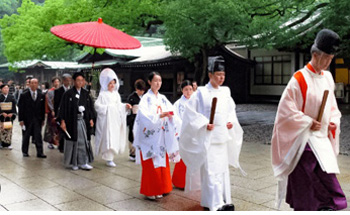
Among pagans marriage continues to be natural marriage, as it was before the Law of Grace
Some authors wrongly consider that these natural marriages outside of the Church can be the Sacrament of Matrimony. It is the case of De Smet (Tractatus theologico-canonicus de sponsalibus et matrimonio, Bruges, 1927, pp. 152 ff.) and Sasse (Théologie de Malines. t .II. p. 390), who pretend that the unfaithful belong virtually to the Church and that their marriages are virtual Sacraments (Vacant Mangenot, Dictionnaire de Theologie Catholique - DTC, t. IX, col. 2294)
This position was an anticipation of the theory of the Anonymous Christian by the well-known progressivist Fr. Karl Rahner S.J. applied to the Sacrament of Matrimony. - Marriage as a Sacrament in the New Testament – That same natural contract which existed among the Jews was elevated to the level of Sacrament at the Wedding of Cana, when Our Lord honored it by assisting at it and approving it. That transformation of the natural marriage into a Sacrament was symbolized by the miracle He operated at that wedding, transforming the water in wine.
That is, the natural marriage was water and was transformed into wine – the Sacrament – by Our Lord. The two spouses continued to be the ministers of the contract, which miraculously was transformed into a Sacrament, but the one who made the miracle was Our Lord. Likewise, as in the miracle of the transformation of water into wine, the ministers were the servants who brought the water, and then Our Lord sent the wine to be checked by the majordomo. But the main agent in that miracle was Our Lord who performed it.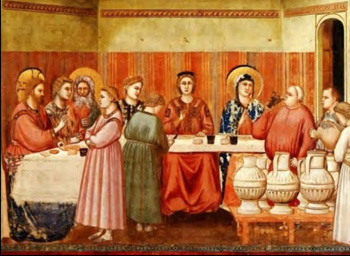
In the Wedding at Cana Christ makes us understand
His role in the Sacrament of Matrimony
So, I would say that in the Sacrament of Marriage there are two simultaneous types of ministers: the spouses who consent officially to live together until the end of their lives to beget and form offspring, and the Church who was delegated by Our Lord Jesus Christ to distribute His Sacraments. It is she who by her presence operates the miracle of the transformation of the natural marriage into the Sacrament of Marriage.
I will comment further below (III.1) on this double ministry, after clarifying the terms and concepts.
This doctrine that marriage was instituted at the wedding of Cana is confirmed by St. Augustine and St. Cyril of Alexandria.
St. Augustine: “So, the Lord went to the marriage [of Cana] to confirm conjugal chastity and to manifest the sacrament of marriage - Ad hoc ergo Dominus venit ad nuptias ut conjugalis castitas firmaretur et ostenderetur sacramentum nuptiarum.” (In Joan., tr. IX, 2, P.L., t. 35. col. 1459, apud DTC, t. IX, col. 2102)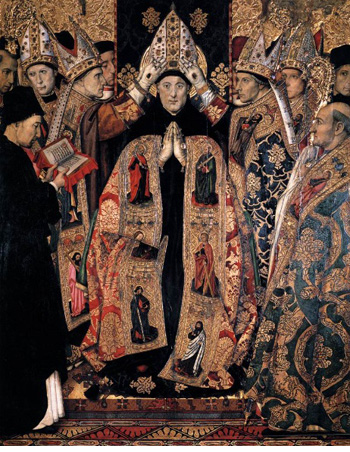
St. Augustine: ‘At Cana Our Lord
manifested the Sacrament of Marriage’
St. Cyril of Alexandria: “As the wedding [of Cana] was celebrated with complete chastity and honor, the Mother of the Savior was also present. He [Christ] went with His disciples, not so much to take part in the feast as to work a miracle and sanctify the principle of man’s carnal generation. Indeed, it was convenient that He, who would renew human nature and elevate it to a more perfect state, would not only grant His blessing to those who were already in the world, but would prepare His grace for those who would be born afterwards and would sanctify their birth.” (In Joan. II. 1. 2, P.G. t. 73, cols. 223, 224, apud ibid.)
The commentator of the Dictionary of Catholic Theology presents a summary of the teaching of the Fathers of the Church regarding this institution at Cana:
For the Fathers, “those graces [of marriage] had as their source the sanctification that Jesus gave to marriage, and the first manifestation of this was His presence and His first miracle at the wedding of Cana. This sanctification is renewed at each marriage and the sensible sign of it is the blessing and the other ceremonies with which the Church surrounds it.” (DTC, ibid. col. 2109)
Leo XIII confirms this institution in the Encyclical Arcanum Divinae Sapientiae:
“Jesus Christ, who restored our human dignity and who perfected the Mosaic Law, applied early in His ministry no little solicitude to the question of marriage. He ennobled the marriage in Cana of Galilee by His presence, and made it memorable by the first of the miracles which he wrought; and for this reason, from that day forth it seemed as if the beginning of new holiness had been conferred on human marriages. “(Arcanum, § 8)
Our Lord spoke extensively about marriage in Matthew (19: 3-18) and this text has always been one of the foundations upon which the Sacrament of Matrimony and its indissolubility were established. - Marriage as a Sacrament represents mystically the union of Christ with the Church – As Catholics know, St. Paul exhorted the spouses to treat one another with dignity by stressing that marriage has as its model the mystical union of Christ with His Church (Eph 5: 22-31). St. Paul, however, did not enter into details on this similarity; he simply said that it was a Great Mystery, Sacramentum Magnum (Eph 5: 32). Oftentimes this mystical figure and its correspondent term Sacrament are used to justify marriage as a Sacrament of the Church.
Many Popes, Councils, Fathers and good authors based the idea of marriage as a Sacrament on this text of St. Paul.
II – Different fields where Marriage is involved
In addition to the different meaning of Sacrament, the different fields under which marriage is subjected must also be considered.
Since marriage is a natural contract and was elevated to a Sacrament there are various fields of human activity under which it falls.
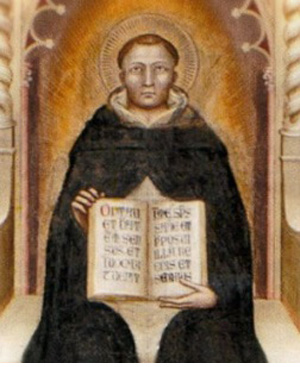
The teachings of St. Thomas on marriage have been greatly simplified
“As far as it is of the natural order the marriage is ruled by the natural law; as far as it is a society it is ruled by the civil law; as far as it is a sacrament it is ruled by divine law.” (Contra Gentiles, I. IV, c. 78, apud DTC, ibid, col. 2172)
Thus, there are certain fields in which the Church has to make decisions, and there are other fields – the legal age to marry, the marriage registration, the rights over the common properties of the spouses, the laws of succession in case one spouse dies, etc – that belong to the temporal power to decide.
It seems indispensable to take into consideration this incidence in different fields because the confusion of the fields of marriage has raised a good deal of commotion in the History of the Church until this day.
This overlapping reality led to the pretension of the State to usurp the prerogatives of the Church under the sophism that marriage has two aspects – the contract and the sacrament – so that only the State can govern the natural contract, while leaving the sacrament for the Church. I will return to this topic later (III.2).
Another example of how the natural contract transformed into a sacrament can lead to misunderstandings is our present discussion.
Without establishing a clear distinction of the overlapping fields we may slip in the concepts.
III. Arguments contrary to the thesis that only the spouses confect the Sacrament
There are some arguments that clearly oppose the doctrine that the spouses are the sole ministers of the Sacrament of Marriage.
- Lessening the role of the Church
The main objection regarding the modern idea that the spouses are the only ministers of the Sacrament of Marriage follows:
The Catholic Church has seven Sacraments all instituted by Our Lord Jesus Christ. He founded the Church and mandated her to administer these Sacraments to her members. If the Church were not the minister for the Sacrament of Marriage, but only the spouses were, this would suppose that either she is not able to accomplish her divinely mandated task regarding this Sacrament, which is absurd, or that the spouses receive a parallel mandate of Our Lord to distribute divine grace, which is also absurd.
So, to avoid these two absurd suppositions, the solution should not be sought by excluding the role of the Church as a minister of this Sacrament, but in a harmonic complementation of the roles of the Church and the spouses in the confection of the Sacrament of Marriage.
Indeed, St. Albert the Great raises the same objection and reaches an analogous solution:
“Diverse species have diverse efficient causes; now, [in marriage] the sacrament and the contract of justice are of different species. Therefore, diverse are the efficient causes: although the consent is the cause of the contract, it is not the cause of the matrimony” (In IV Sent., dist. 27, a. 4; apud DTC ibid, col. 2197)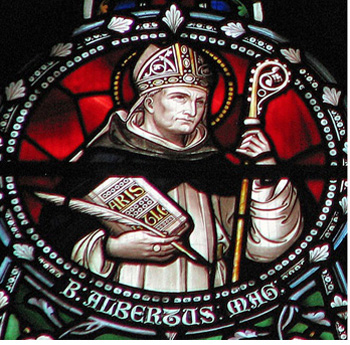
St. Albert the Great: The Sacrament of Marriage has two causes, one divine & other human
He stresses the objection still further: “Matrimony is a sacrament: but in all sacraments the divine virtue is efficient, as Augustine says, therefore, the efficient cause of matrimony is the divine virtue and the mutual consent is not the efficient cause of matrimony.” (apud ibid)
Next, he resolves the objection: “This sacrament [of matrimony] … so far as the divine is concerned is divine to us: … so far as it is about a human act, it depends on the acts of men, just as penance also depends on some of its acts.” (ibid.)
St. Thomas Aquinas gives a clearer response to the problem of marriage having two efficient causes:
“The first cause of the sacraments is the divine virtue which operates the salvation in them, but the second instrumental cause is the material operations having efficiency by divine institution, and thus the consent in marriage is the cause.” (IV Sententiarum, dist. 27, q. 1, a. 2, sol. 1, ad 1, apud DTC, t. IX, col. 2198)
In passing let me observe that from this statement by St. Thomas we see that his text you quoted about marriage is not final, and should be viewed alongside this and harmonized with it: that is, when he said that the form of the Sacrament is the consent and the blessing was a sacramental, he was just defining a part of the topic, not the entire context as he does here.
So, from the texts quoted above, the conclusion is that there are two efficient causes to effect the Sacrament of Matrimony, the first is divine, the second is human, by divine institution.
It seems that the manuals of theology used in seminaries even before Vatican II did not take this distinction into consideration. Further, they forgot the role of God in this Sacrament; they mentioned neither His part nor the part of the Church in the administration of this Sacrament.
In modern theology there is a general omission of the Scholastic current of thought of which St. Thomas, St. Albert the Great and St. Bonaventure were the main representatives. So, I do not fault you for being unaware of the existence of two schools regarding the ministers in the Sacrament of Marriage.
If there are two schools of thought regarding the ministers in marriage, I ask you to consider that your thesis should be seen an opinion of one school on a matter in the state of discussion, not a definitive doctrine of the Church.
Let me continue, quoting some other Scholastic texts.
St. Albert makes distinctions on the various aspects of marriage to show the role of the Church in it:
“Marriage can be seen in various aspects, be it as a natural office, be it as a Church's good and this can be effected by consent … But in the third way it is as a remedy, and thus it is placed under the keys of the Church and exists by the dispensation of the ministers, and has a form expressed before the Church, receives the benediction of the Church, and is effected by the Church, not as a sacrament per se, but as sacrament of the Church in order to be a remedy by the power of the Church herself.” (IV Sententiarum, dist. 1, n. 14, apud DTC, t. IX, col. 2206)
St. Bonaventure considers the blessing of the Church indispensable as well:
“Marriage takes on the aspect of spirituality and grace when it works as a blessing through consent, where the meaning is explained, and sanctification is obtained through the blessing, and, therefore, the spiritual aspect consists mainly in the priestly blessing.” (Dist. 26, a. 2, q. 11, ad 4 apud DTC ibid. col 2206)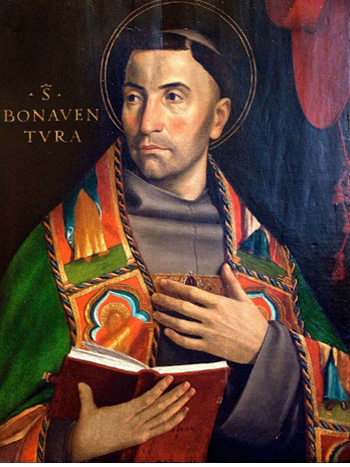
St. Bonaventure: ‘The sanctification in marriage is obtained through the blessing of the Church’
If I understood these texts well, they seem to prove that in normal conditions the presence of the priest as a representative of the Church is necessary for the consent or contract to become a Sacrament; even when the blessing per se may be a sacramental, the priest represents the presence of the Church and the act of blessing expresses her approval.
As noted before, it is similar to the instance of Our Lord Jesus Christ who was present at the wedding of Cana, and, by His presence, the miracle of the water changing into wine was operated. St. John did not refer to any word or blessing by Our Lord, which nonetheless should have existed. He only refers to His presence and approval. Analogously the presence of the Church is necessary for the miracle to be operated: The natural contract becomes the Sacrament of Matrimony.
At the moment the spouses emit their consent, the natural marriage – the water – is transformed into the Sacrament – the wine. So the spouses are the indispensable minor efficient cause. It was indispensable to have the water to work the miracle, but the transformation would not have taken place if Our Lord were not present and had approved the marriage and worked the miracle. He is the major efficient cause of the Sacrament of Marriage.
This opinion of the Fathers and the Scholastics defending that the Sacrament of Marriage has two efficient causes and therefore two types of ministers – the Church and the spouses – was never condemned by the Church. It was accepted by all Catholics alongside the other opinion defended by many until the 16th century and defended with emphasis by the Jesuits afterwards. This latter opinion proposes that only the contract/consent makes the Sacrament.
Objection
Erudite progressivist authors, such as G. Le Bras who wrote the entry Marriage, Modern Doctrine, The Sacrament for the French Dictionary of Catholic Theology, allege that Pius IX in his letter Ad Apostolicae Sedis (August 22, 1851) and Leo XIII in the Encyclical Arcanum Divinae Sapientiae condemned the Scholastic opinion. (DTC, t. IX, col. 2303)
Answer
This affirmation is not objective.
What Pius IX condemned – along with other errors of Johannes Nepomucene Nuytz – was this:
“That the sacrament of marriage consists only in the blessing of the priest – ipsumque Sacramentum in una tantum nuptiali benedictione situm esse.” (Ad Aposlolicae Sedis, in Recueil des Allocutions Consistoriales, Encycliques et Autres Lettres Apostoloques des Souverains Pontiffs Clement XII, Benoit XIV, Pie VI, Leon XII, Gregoire XVI et Pius IX Citées dans l’Éncyclique et le Syllabus du 8 Décembre 1804, Paris: Adrien Le Clere, 1865, pp. 294, 295).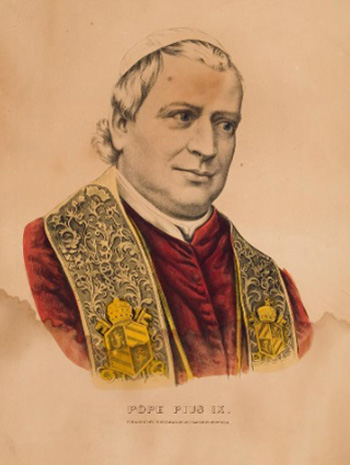
Neither Pius IX nor Leo XIII condemned
the ecclesiocentric school
Such condemnation does not apply to any point of the doctrine defended by the Scholastics, which I am following. For these scholars the blessing of the priest is a manifestation of the presence of the Church and her approval, not a constitutive element of the Sacrament, although St. Bonaventure affirms it was necessary, but never the only element of the Sacrament.
As far as Arcanum is concerned, Leo XIII, refuting the errors of the Regalists who, on the topic of marriage separated the contract from the Sacrament in order to steal the power of the Church over it and transfer it to the Monarch, affirmed:
“Let no one, then, be deceived by the distinction which some civil jurists have so strongly insisted upon – the distinction, namely, by virtue of which they sever the matrimonial contract from the sacrament, with the intent to hand over the contract to the power and will of the rulers of the State, while reserving questions concerning the sacrament of the Church. A distinction, or rather severance, of this kind cannot be approved; for certain it is that in Christian marriage the contract is inseparable from the sacrament, and that, for this reason, the contract cannot be true and legitimate without being a sacrament as well. For Christ Our Lord added to marriage the dignity of a sacrament; but marriage is the contract itself, whenever that contract is lawfully concluded.” (Arcanum, § 23)
All I exposed above shows that the opinion of the Scholastics supposes the same position that Leo XIII affirmed. It only adds the role of the Church in the administration of the Sacrament. Therefore, it is not included in this condemnation. - Confusion with civil marriage
In the text you quoted confirming your opinion, the author defends that “those who contract marriage are the ministers, whether they are aware of it or not, even if heretics, who do not think marriage is a Sacrament at all.”
I believe that the statement that “those who do not think marriage is a sacrament” are the ministers of the sacrament of marriage opens the doors to confusions. One of them is that a baptized couple who would be married in a civil marriage would have already received the Sacrament.
In some instances in History, but mainly after the birth of the Modern State in France (1792), the State declared its separation from the Church. As a consequence, the State established the civil marriage as obligatory for those who thenceforth would marry in France.
Many countries imitated France and until this day in them the civil and the religious marriages are celebrated separately. One ceremony is celebrated for the State before a lay official, often a Justice of the Peace, and a notary who issues a certificate of marriage. Another ceremony is celebrated in the Church before a priest and there it acquires the rank of a Sacrament.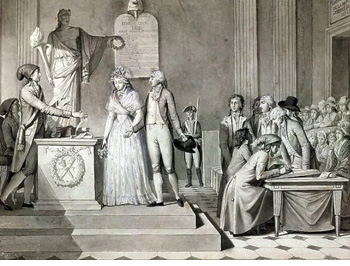
The French Revolution introduced civil marriage, above, to steal the role of the Church in matrimonies
In some countries, as in the U.S., there are agreements according to which the religious ceremony of marriage is recognized by the State and has civil effects. In this case the couple signs civil documents in the sacristy and they are sent to the State in order to receive its official civil approval. In the U.S. there are also couples who do not want to have a religious marriage and marry only in the civil ceremony, before a Justice of Peace.
According to the text you mention, in those countries every baptized couple who would decide to contract civil marriage would actually effect the sacrament. So, according to your author there would be no difference between the civil marriage of two baptized persons and the Sacrament of Marriage.
However, the Church does not recognize the civil marriage to be a sacrament.
On the contrary, Pius IX in the Allocution of September 27, 1852, qualifies it as “vile and pernicious concubinage“- turpis ac exitialis concubinatusd. An analogous expression – “an abominable concubinage” – was used by Leo XIII in his Encyclical Inscrutabili. (Cf. DTC, ibid. col. 2283)
IV – Two schools of thoughts on the ministers of marriage
When we go to study the History of the Church on the topic that interests us, we see that for 16 centuries there was a lively discussion between the two schools of thought that I mentioned: One defending that marriage is effected by both the Church and the spouses, the other defending that this takes place only by spouses.
Already in the 15th century, the Humanists had taken a juridical position on this Sacrament based on the definition of marriage given by Justinian in his Codex Iuris Civilis – Code of Civil Law. The discussion continued between the ecclesiocentric school and the humanist school – as I will call them here.
To combat Luther and Calvin who denied that Our Lord instituted the Sacrament of Marriage, the humanist school prevailed. Perhaps it was because it was easier to demonstrate that the contract and the sacrament are the same thing. For St. John did not describe precisely how the miracle took place in the Cana wedding. No form or blessing is specified; what is certain is that the miracle occurred.
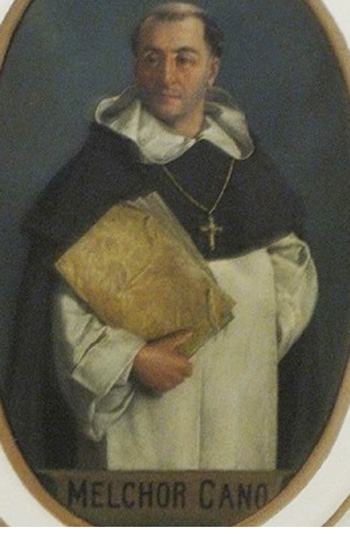
Dominican Fr. Melchor Cano was a great advocate of the ecclesiocentric school
In the 18th century Catholic marriage was again attacked frontally, this time by the Philosophers (Voltaire) and the Enlightened Monarchs (Emperor Joseph II). Soon after, France established the civil marriage and the Church was obliged to fight back by stressing her power over marriages. There was no time to return to the old dispute on the ministers.
With this we arrive at the 19th century with Napoleon kidnapping the Pope and bringing him to France, with Bismarck leading the Kulturkampf against the Church, with Catholic Liberalism supporting the French Revolution, with Garibaldi usurping the Pontifical Territories and Pius IX contra-attacking. There was no time to return to the dispute on ministers of the marriage.
The 20th century opened with the very liberal/modernist Card. Gaspari – the “twin brother” of Card. Rampolla – as a champion of the humanist school. No return to the ecclesiocentric school.
The manuals of theology that reached the seminaries in the 20th century omitted reporting the historical dispute. They tendentiously report only the opinion of the humanist school as the supposed pacifically accepted thinking of the Church on the topic.
Thus, it is not surprising that you – and many others – would believe that this opinion is the only one and that those who defend the ecclesiocentric school are in error. They are not.
The question of the ministers of the Sacrament of Marriage is still an open question. No condemnation was ever issued by the Church, as far as I could verify, against the opinion of the Scholastics.
Further, it appears that the humanist opinion, which centered only on the decision of the spouses, opened doors for the errors of Progressivism, which has overtaken the Church. The counter-attack against the errors of Progressivism gives a new momentum to the ecclesiocentricl school to re-enter the stage.
V - Progressivist onslaught against the role of the Church in the Sacraments
Progressivism, this updated heir of Modernism, has made every effort possible to present a new doctrine of the Church centered on man.
Rahner’s Anthropological Reduction or Transcendental Anthropology, Maritain’s Integral Humanism, Schillebeeckx’ The Church with a Human Face: a New Theology of the Ministry are just three examples among many of how Progressivism is trying to build a New Church centered on man. These new theologies were duly confirmed by Paul VI’s affirmation to the United Nations: “We are worshipers of man.”
An entirely New Theology of the Sacraments has replaced the dogmatic teaching of the Church.
We have seen the Eucharist come to be considered not as transubstantiation, but as transignification, that is, the real Body of Christ is not the bread and wine transformed into the Body and Blood of Christ, but it merely signifies that the community present at Mass is the real Body of Christ.

Beach weddings, one of the Conciliar Church's many abuses that claims to be a sacrament
Marriage has been destroyed in many ways, which include virtual divorce through annulments under almost any pretext; virtual approval of contraception, approval of pre-marital relations, and now the papal approval of blessings for homosexual couples.
Analogous attacks have been directed against the other Sacraments.
As you know, the destruction of the Sacraments is just one aspect of the destruction of all the doctrines and institutions of our Holy Mother Church. Since the Church cannot be destroyed, we are on the eve of a Divine Intervention.
So, our discussion will not change anything in this process.
I am not writing to conclude that I am right and you are wrong. I understand that your judgment that I am wrong comes from the progressivist books you studied in your seminary, which hid the existence of a multi-secular ongoing discussion on this topic. I hope you may understand my position: that I am trying to show that the question of the ministers of this Sacrament is still open and my attempt to restore a position that encompasses the best side of both schools.
I am taking your time and that of TIA’s readers to propose that in the future, when the Church will be rebuilt from the present day catastrophe, a future Pope or Council may focus the Sacrament of Matrimony, not only centering on man, as has been done in the last centuries, but restoring to it a harmonic theological explanation that gives to God and His Church the place they must have in this and the other Sacraments, as it began to have in the time of the Fathers and the Doctors.
With respect,
I ask your priestly blessing,
Atila S. Guimarães















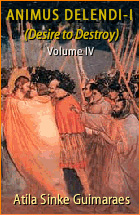
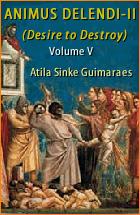






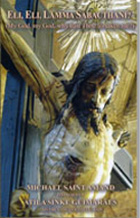
Published: Under section ‘Giving away of the bride…’ paragraph 8, the authors state:
“Consequently, the ministers of the natural contract are the spouses; the minister of the Sacrament is the priest.”
Here I merely offer my instruction as a priest to the authors, it is your article.
The statement is false and in fact the opposite is true. This can be known upon consulting any knowledgeable priest or many readily available texts, but I briefly offer the following:
In Matrimony, the contract is the Sacrament. St. Thomas Aquinas teaches, “The words whereby the marriage consent is expressed are the form of this Sacrament, and not the priests blessing, which is a sacramental.” (Summa Theologica, Third Part, Question 61).
The validity of the contract is governed by the Church’s authority to define what marriage is, make binding laws on Catholics, declare impediments and grant dispensations but concerning the Sacrament itself, the couple confers it upon each other.
In necessity, the indissoluble bond of the Sacrament exists between Baptized parties even in the absence of a priest.
“The parties marrying are the only ministers of the Sacrament; each administers and receives the Sacrament. Consequently, those who contract marriage are the ministers, whether they are aware of it or not, even if heretics, who do not think marriage is a Sacrament at all.” (Henry Davis, Moral and Pastoral Theology, vol IV, p 66).
Fr. S.P.